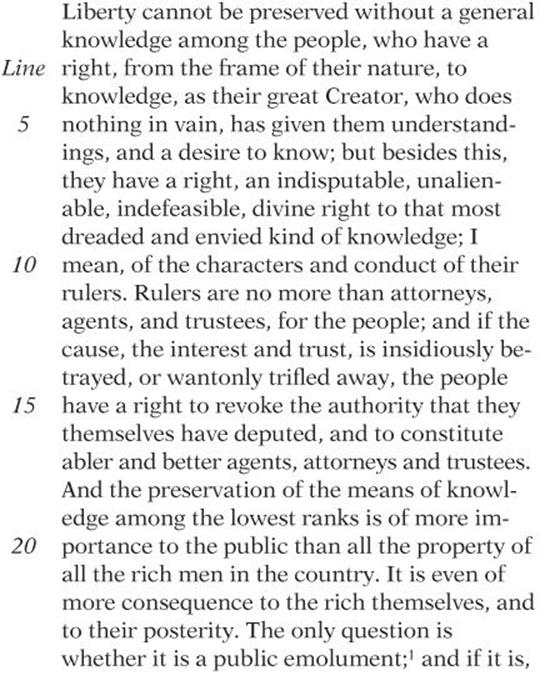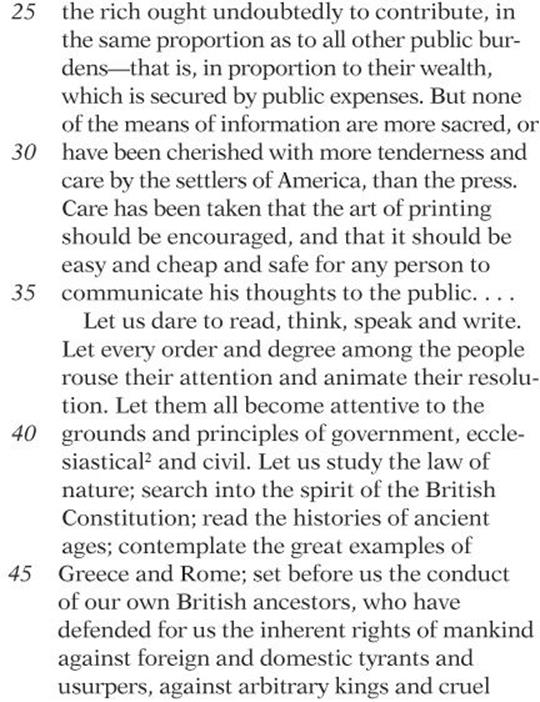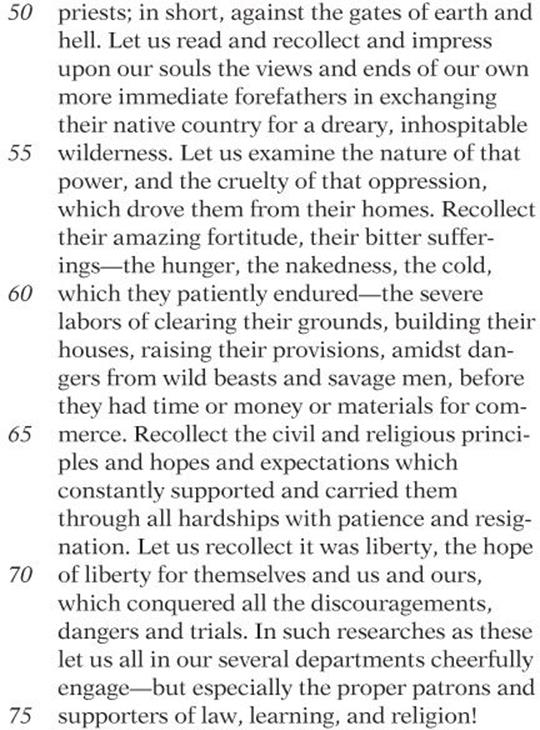SAT Test Prep
CHAPTER 4
CRITICAL READING SKILLS
Lesson 7: Thinking Logically About the Questions
Using Logic on the Questions
Straightforward logic can help enormously on the toughest SAT CR questions. For instance, if one answer choice implies another answer choice, it cannot be correct without both answers being correct; therefore, it must be wrong. Okay, maybe that was a little confusing. Let”s look at an example:
What is the author”s attitude toward the “transgressions” mentioned in line 12?
(A) dismissiveness
(B) vehement opposition
(C) ambivalence
(D) disapproval
(E) resignation
Even if you didn”t read the passage, you should know that the answer couldn”t possibly be (B). Why? Because (B) implies (D). If someone is vehemently opposed to something, he or she sure as heck disapproves of it too, right? So, if (B) were right, (D) would have to be right, too. But there can”t be two right answers! So (B) is out.
Okay, we kind of cheated there, in order to illustrate a concept (just like those physics problems that ignore friction even though it”s always there). In fact, questions that can be solved without reading the passage almost never appear on the SAT (although crack-the-test folks want you to believe it”s chock full of them). But logical thinking is still extremely helpful. It”s just that on the real test, you have to pair it with a solid understanding of the passage.
Meet Logic”s Best Bud, Common Sense
Logic shows you what must be true, given a set of assumptions. Common sense shows you what is probably true, given a set of assumptions. Using basic principles of common sense pays off on the Critical Reading questions.
Let”s go back to the question above. Your common sense tells you that writers write about things they care about. And even if they”re only writing on assignment and don”t really care about the subject, they at least have to pretend that they care about the subject. So decent writers almost never write with a dismissive tone toward their subjects. So choice (A) dismissiveness is probably not the right answer. But don”t be too hasty—it”s remotely possible that the author is really saying, “These transgressions are what other people focus on, but they really don”t matter.” Just check the passage quickly to see if this is the case—but chances are, anyone who writes about transgressions isn”t indifferent about them.
So logical elimination, with quick passage checks, can help a lot. So now you”re left with choices (C) ambivalence, (D) disapproval, and (E) resignation. The answer is (C) if the author thinks the transgressions are both good and bad (remember ambivalent means “having conflicting feelings,” not “unclear and vague”—that”s ambiguous), (D) if he criticizes it consistently, and (E) if he thinks they”re bad, but he can”t do anything about them.
What Can You Do in 500 Words?
Can you “delineate (describe precisely) the history of European political reform” in 500 words? I sure can”t, and neither can anyone who writes SAT passages. But someone sure can “suggest a few political reforms” in 500 words. So, when answering purpose questions, use common sense to eliminate unreasonable or petty purposes.
Which of the following best expresses the purpose of the passage as a whole?
(A) to describe the relationship between literature and history (too big a task—eliminate)
(B) to belittle modern literary critics (possible, but that seems petty—eliminate)
(C) to refute a misconception (very possible and worthwhile—keep)
(D) to delineate a new mode of literary analysis (too big a task—eliminate)
(E) to suggest several remedies for a problem (very possible and worthwhile—keep)
When answering general purpose questions, use your common sense when thinking about the scope of a 500-word essay. It can”t be trivial or petty, but it also can”t do too much.
Concept Review 7: Thinking Logically About the Questions
1. If the answer to a CR question is either “extremely enthusiastic” or “positive,” which must be the correct answer and why?
2. Why is it nearly impossible for an author”s attitude on a topic to be “indifferent?”
Using only logic and common sense, make your best guess on the following questions:
3. The first paragraph implies that art is primarily the product of
(A) desire for wealth
(B) anxiety
(C) exact imitation
(D) reason
(E) intuition
4. With which of the following statements would the author most likely agree?
(A) Voters always choose incapable political candidates.
(B) Voters should be more educated about candidates.
(C) Political candidates rarely campaign effectively.
(D) Politicans do not represent their constituents well.
(E) Voters are not interested in critical political issues.
5. Which of the following best expresses the purpose of this passage?
(A) to dissuade students from studying political science
(B) to describe the evolution of ethics in American history
(C) to attack the credibility of politicians
(D) to refute a misconception
(E) to prescribe a solution to a problem
SAT Practice 7: Thinking Logically About the Questions
The following is an excerpt from John Adams” A Dissertation on the Canon and Feudal Law, written in 1765. John Adams (1735–1826) was the first vice-president of the United States and the second president of the United States.



1. The “right” in line 7 is the right of the people to
(A) pursue happiness
(B) read what they wish
(C) know about their leaders
(D) set up printing presses
(E) run for public office
2. In context, the word “constitute” (line 16) most nearly means
(A) consist of
(B) produce
(C) remove
(D) install
(E) enjoy
3. It can be inferred from the passage that “our own more immediate forefathers” (lines 52–53) endured all of the following EXCEPT
(A) political oppression
(B) difficult terrain
(C) arduous labor
(D) hopelessness
(E) physical deprivation
4. As it is described in line 56, the “power” is
(A) a personal skill
(B) a national virtue
(C) a despotic agent
(D) a mysterious spirit
(E) a fearsome mirage
5. The tone of the second paragraph (lines 36–75) is best described as
(A) prescriptive
(B) critical
(C) objective
(D) melancholy
(E) joyous
6. Which of the following best describes the relationship between the first paragraph (lines 1–35) and the second paragraph (lines 36–75)?
(A) The first describes a current state of affairs, while the second describes a situation in the past.
(B) The first describes a right, while the second gives recommendations for exercising that right.
(C) The first describes a problem, while the second describes a way to remedy that problem.
(D) The first describes a theory, while the second describes the evidence for that theory.
(E) The first addresses the leaders of a country, while the second addresses its citizens.
7. According to the passage, citizens should
I. understand the precepts by which governments and churches are run
II. take up arms for their country in the name of liberty
III. appreciate the sacrifices of their forefathers
IV. study to partake in their government as elected officials
(A) I and III only
(B) I, II, and III only
(C) I, II, and IV only
(D) I, III, and IV only
(E) II, III, and IV only
Answer Key 7: Thinking Logically About the Questions
Concept Review 7
1. The answer must be “positive” because it includes “extremely enthusiastic.” In other words, anyone who is “extremely enthusiastic” is necessarily also “positive.” Therefore, “extremely enthusiastic” cannot be correct without “positive” also being correct, but this contradicts the fact that there is only one correct answer.
2. Because writers generally write about things that interest them. And even when they write about things that don”t interest them (as when they are given an assignment), they still at least pretend to be interested, so they do not write with a tone of indifference.
3. Best choice: E What would a reasonable person say about where art primarily comes from? You don”t need special knowledge here, just common sense.
(A) desire for wealth (Are most artists moneygrubbers? Probably not.)
(B) anxiety (Are most artists anxious? Could be, but that”s mean.)
(C) exact imitation (Do most artists make exact copies? No.)
(D) reason (Do most artists paint logically? Probably not.)
(E) intuition (Do most artists rely on feelings and hunches? Seems reasonable.)
4. Best choice: B Focus on the exclusivity of the answers:
(A) Voters always choose incapable political candidates. (“Always” is exclusive; statement is mean.)
(B) Voters should be more educated about candidates. (Reasonable and inclusive.)
(C) Political candidates rarely campaign effectively. (“Rarely” is somewhat exclusive; statement is harsh.)
(D) Politicans do not represent their constituents well. (“Do not” is exclusive; statement is mean.)
(E) Voters are not interested in critical political issues. (Since this answer would imply that (B) is also true, it must be wrong.)
5. Best choice: D or E Think about what can reasonably be accomplished in 400–800 words.
(A) to dissuade students from studying political science (Reasonable but harsh and petty.)
(B) to describe the evolution of ethics in American history (Far too big a task.)
(C) to attack the credibility of politicians (Reasonable but harsh.)
(D) to refute a misconception (Reasonable.)
(E) to prescribe a solution to a problem (Reasonable.)
SAT Practice 7
1. C The “right” is described as the right to “knowledge … of the characters and conduct of their rulers.”
2. D The sentence says that “the people have a right to revoke the authority that they themselves have deputed, and to constitute abler and better agents….” This means that they can remove the leaders who don”t lead well and replace them with those who do. So constitute means something like replace them with, or choice (D) install.
3. D The passage explains that “our own more immediate forefathers” experienced
(A) political oppression: “that oppression … which drove them from their homes” (lines 56–57)
(B) difficult terrain: “inhospitable wilderness” (lines 54–55)
(C) arduous labor: “severe labors” (lines 60–61)
(E) physical deprivation: “the hunger, the nakedness, the cold” (line 59) However, lines 69–71 say that it was “the hope of liberty … which conquered all the discouragements….”
4. C The “power” is described as that “which drove them from their homes.” So it is a despotic agent.
5. A Most sentences begin with “Let us …,” which indicates that he is strongly suggesting what his fellow citizens should do. He is prescribing action.
6. B The first paragraph describes the “right … to knowledge,” while the second describes what kind of knowledge the citizens should acquire.
7. A The passage does not advocate taking up arms or running for office. It does, however, say that citizens should “become attentive to the grounds and principles of government, ecclesiastical (churchrelated), and civil” (lines 39–41) and reflect on their forefathers” “amazing fortitude [and] bitter sufferings” (lines 58–59).